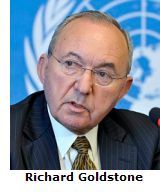 As part of its Hunger to Learn series, the BBC’s Katya Adler “meets children in Gaza whose schooling has been repeatedly interrupted by conflict.” Undoubtedly, Palestinian children have suffered as a result of difficult conditions in Gaza. However, Adler’s report demonstrates typical BBC bias:
As part of its Hunger to Learn series, the BBC’s Katya Adler “meets children in Gaza whose schooling has been repeatedly interrupted by conflict.” Undoubtedly, Palestinian children have suffered as a result of difficult conditions in Gaza. However, Adler’s report demonstrates typical BBC bias:
-
The report implies that Israel deliberately bombed a primary school during the recent Gaza conflict. Israel’s motivations for taking military action are subtly questioned: “Israel says this is in response to rocket and mortar fire by Gaza militants, aimed at Israeli citizens.” Does the BBC believe it possible that Israel took military action in Gaza simply for the sake of it?
Indeed, while Israel does not deliberately target schoolchildren, the same cannot be said of Palestinian terrorists who have deliberately launched rocket attacks at specific times when Israeli children are travelling to their schools, considering it an achievement if a rocket lands (as they have done on numerous occasions) on schools or kindergartens.
-
Adler discusses the mental scars of Gazan children due to Operation Cast Lead, referring to psychological and social problems and difficulty concentrating. While this may be the result of Israel’s three-week operation, the same descriptions could be equally applied to the Israeli children of Sderot who have suffered from 8 years of rocket attacks from Gaza.
-
Despite this, nowhere in the online text is any reference to the suffering and trauma of Israeli children whose education and daily lives have also been affected by conflict. However, perhaps in a poor attempt to claim a semblance of balance, Adler interviews two Israeli pupils from Sderot in the second of two short video segments.
 Deliberately downplaying the situation in Sderot, Adler says to them: “When you talk to schoolchildren in Gaza they say look at us, so many of us are killed in wars with Israel, whereas in Sderot not many children die, not many are injured, not many rockets are actually fired.” Would Adler consider questioning Gazan pupils about their views on rockets fired at their Israeli counterparts?
Deliberately downplaying the situation in Sderot, Adler says to them: “When you talk to schoolchildren in Gaza they say look at us, so many of us are killed in wars with Israel, whereas in Sderot not many children die, not many are injured, not many rockets are actually fired.” Would Adler consider questioning Gazan pupils about their views on rockets fired at their Israeli counterparts?
In fact, some 12,000 rockets and mortars have been fired from the Gaza Strip since 2001 while over 1,000 people have been wounded as a result.
-
Indeed, the attitude and presentation between the two videos is striking. Israeli pupils are interviewed in a sterile and quiet school playground environment, pictured talking directly to Adler. In stark contrast, the segment in Gaza is interspersed with dramatic scenes of conflict and destruction to accompany the interviews with Palestinian children. There are plenty of images and footage available of rocket attacks on Sderot but the BBC evidently chose not to use them thus downplaying their effects.
Katya Adler’s lip service to balance is yet another example of the BBC’s anti-Israel bias.
 Perhaps more disturbing is an almost identical video clip adapted from Adler’s report for Children’s BBC Newsround, aimed specifically at British schoolchildren. Complete with images of the Gaza conflict, there is no attempt to provide context to the military operation other than to say that a school had been bombed by Israel “to protect its own soldiers from attack.”
Perhaps more disturbing is an almost identical video clip adapted from Adler’s report for Children’s BBC Newsround, aimed specifically at British schoolchildren. Complete with images of the Gaza conflict, there is no attempt to provide context to the military operation other than to say that a school had been bombed by Israel “to protect its own soldiers from attack.”
There is no mention of Sderot, Hamas, Palestinian terror or any other details, even in a simple form that might aid a child’s understanding of the situation. Instead, young minds will invariably perceive Israel as the bad guy in the story. Yet more pernicious reporting from the BBC – poisoning children against Israel.
You can send your comments to the BBC Complaints website – http://www.bbc.co.uk/complaints (for detailed instructions on how to navigate the BBC Complaints website, click here).
UNDERSTANDING THE GOLDSTONE REPORT
 A new site – Understanding the Goldstone Report – has been established by a group of bloggers who have followed the news stories and NGO reports from Israel’s Operation Cast Lead, and the history of the Goldstone Commission. They have come together to offer a site that will put together the most cogent, empirically based, and logically argued critique of the Goldstone Commission.
A new site – Understanding the Goldstone Report – has been established by a group of bloggers who have followed the news stories and NGO reports from Israel’s Operation Cast Lead, and the history of the Goldstone Commission. They have come together to offer a site that will put together the most cogent, empirically based, and logically argued critique of the Goldstone Commission.
Check out Understanding the Goldstone Report and also read HonestReporting’s Special Report – The Goldstone Report: Rewarding Palestinian Terror – for more information. We are continuing to update the Further Resources section at the bottom of that communique as more resources become available.

